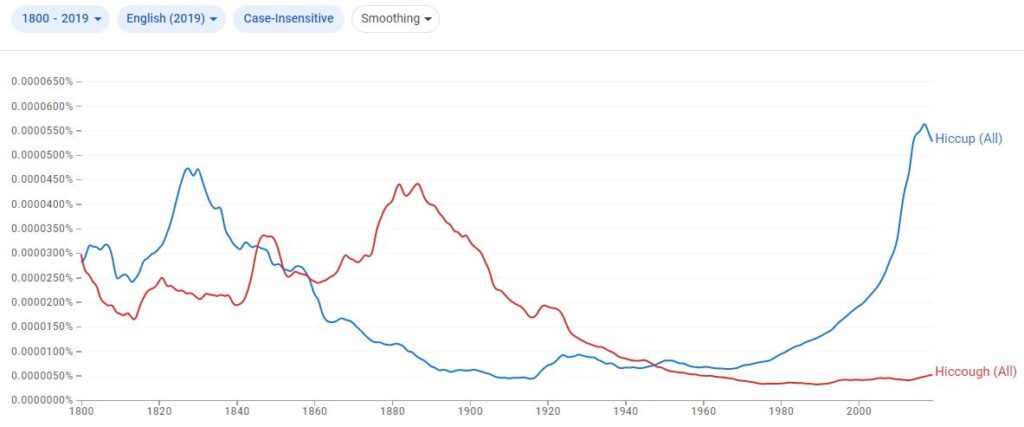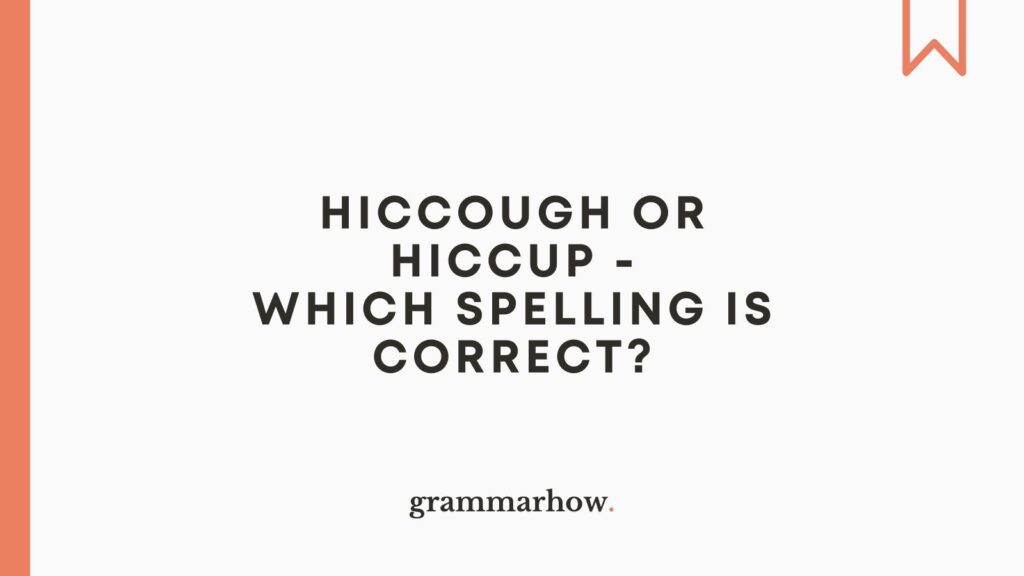We’re all familiar with that tight feeling in our chest and the involuntary sounds we make when we have hiccups! Or is it spelled “hiccoughs”?
If you just can’t keep making hilarious sounds without knowing the correct spelling and etymology behind their namesake, you’ve come to the right place!
Hiccough or Hiccup – Which Spelling Is Correct?
Both “hiccup” and “hiccough” are correct spelling variations in English. However, English speakers consider “hiccup” the most correct variation on account of the etymology of each word and current spelling conventions. We use “hiccup” most frequently in modern English globally.
According to the Oxford English Dictionary, “hiccup” and “hiccough” share a similar etymology. “Hiccup” is derived from the earlier words “hickop,” “hicket,” and “hyckock.”
“Hyckock” is the earliest variation. The “hyck” in “hyckock” mimics the cute little sound people make when their diaphragm involuntarily contracts. It is a sensation with which we are all familiar and the resulting sound is quite humorous too!
The “ock” was a diminutive suffix, which is an addition to a noun that indicates that the noun is small in size, like adding the suffix “lets” to “drop” to show that the water is in the form of tiny little droplets.
In short, “hyckock” essentially means “little hyck,” thereby precisely describing the sound made when a person has hiccups. Adorable.
As language progressed, both “hiccup” and “hiccough” became accepted variations. Therefore, both of the following example sentences are correct:
- Matt, I know you’re in there! I heard you hiccup three times. You can’t hide when you have hiccups, Matt.
- Somebody frighten me; I need to get rid of these hiccoughs.
So, both are technically correct, but should our treatment of one differ from the other? Is there any real difference between these variants?
Hiccup
English speakers consider “hiccup” the most correct spelling, and according to this diagram by the Google Ngram Viewer, it is the most used variation in both American and British English.

The Oxford English Dictionary stipulates that this variation of the spelling first appeared in 1788. It comes from the earlier version, “hickock,” and similarly acts as an onomatopoeia for the sound we make when our diaphragm spasms.
Consider the following example sentences:
- He’s going on stage in less than 40 seconds, and he has a terrible bout of hiccups!
- Your baby made a strange sound – something between a burp and a hiccup. Either way, please take it away from me immediately.
Hiccough
According to the Google Ngram Viewer diagram above, “hiccough” was actually the most frequently used spelling between 1858 and 1947.
Nonetheless, we now know that “hiccough” developed from an error, as people mistakenly confused the “ckock” in “hyckock” with “cough.”
This explains why you might still see some use of this variation in Canada, the US, and the UK. Through frequent use, this variation was accepted as correct in English, and it still is despite its less frequent use in modern times.
Nonetheless, like its predecessors and its counterpart, “hiccup,” “hiccough” refers to the sound one makes when their diagram convulses – a sweet little “hic” sound!
Consider the following example sentences to see this variation in action:
- “I’m okay – it was just a little tumble,” he said with a hiccough, and the mechanism in his bicycle popped softly as he pushed it away.
- I drank thirteen glasses of water and hung upside down for fifteen minutes, but these hiccoughs persist!
Conclusion
To conclude, both “hiccup” and “hiccough” are technically correct. However, “hiccup” is considered the most correct spelling across the globe.
Both are derived from the word “hyckock,” which is an onomatopoeia of the sound one makes when their diaphragm convulses.
Which spelling is used does not appear to be regionally dependent. Thus, you may encounter both spellings in literature in the UK, US, Canada, and any other English-speaking countries.

Martin holds a Master’s degree in Finance and International Business. He has six years of experience in professional communication with clients, executives, and colleagues. Furthermore, he has teaching experience from Aarhus University. Martin has been featured as an expert in communication and teaching on Forbes and Shopify. Read more about Martin here.

